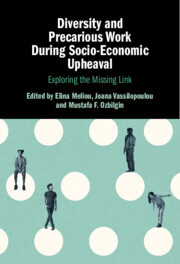Book contents
- Diversity and Precarious Work during Socio-economic Upheaval
- Diversity and Precarious Work during Socio-economic Upheaval
- Copyright page
- Contents
- Figures
- Contributors
- 1 Introduction
- 2 Pandemic Precarities and Gendered Biopolitics within the Neoliberal University
- 3 LGBTQ+ Individuals and Precarious Work
- 4 Age, Gender, and Precarity
- 5 How the (In)Ability of Using One’s Disability Strategically Reinforces Inequality and Precariousness amongst Disabled Workers
- 6 Classed and Gendered Experiences of Precarity in Dirty Work
- 7 Precarity and Diversity
- 8 Precarious Work in the Gig Economy
- 9 Refugees’ Vulnerability towards Precarious Work
- 10 Trapped in Precarious Work
- 11 How Precarity Is Threaded into Migration Rules
- 12 Culture, Precarity, and Dignity
- 13 Transforming Humanitarianism
- 14 Artificial Intelligence, the Gig Economy, and Precarity
- Index
- References
11 - How Precarity Is Threaded into Migration Rules
The Cases of the UK, Germany, and Australia
Published online by Cambridge University Press: 01 February 2024
- Diversity and Precarious Work during Socio-economic Upheaval
- Diversity and Precarious Work during Socio-economic Upheaval
- Copyright page
- Contents
- Figures
- Contributors
- 1 Introduction
- 2 Pandemic Precarities and Gendered Biopolitics within the Neoliberal University
- 3 LGBTQ+ Individuals and Precarious Work
- 4 Age, Gender, and Precarity
- 5 How the (In)Ability of Using One’s Disability Strategically Reinforces Inequality and Precariousness amongst Disabled Workers
- 6 Classed and Gendered Experiences of Precarity in Dirty Work
- 7 Precarity and Diversity
- 8 Precarious Work in the Gig Economy
- 9 Refugees’ Vulnerability towards Precarious Work
- 10 Trapped in Precarious Work
- 11 How Precarity Is Threaded into Migration Rules
- 12 Culture, Precarity, and Dignity
- 13 Transforming Humanitarianism
- 14 Artificial Intelligence, the Gig Economy, and Precarity
- Index
- References
Summary
This chapter investigates the precarious arrangements embedded in the systems and processes of migration management across three different country contexts: the UK, Germany, and Australia. The country comparison shows how precarious workplace/worker and societal arrangements have been woven into the systems of migration management (Paret and Gleeson ; Vosko ). The examination employs an historical methodology to show how approaches to migration management create a racialised precarity in the destination country generally; and more specifically in the destination country labour market where different groups of migrant workers are channelled into and toil in the least favourable areas of the labour market. Accordingly, we shed light on the rules underscoring and the implications of the process of migrant worker acceptance, settlement, and integration in a new land and labour market.
Keywords
- Type
- Chapter
- Information
- Diversity and Precarious Work During Socio-Economic UpheavalExploring the Missing Link, pp. 213 - 239Publisher: Cambridge University PressPrint publication year: 2024

